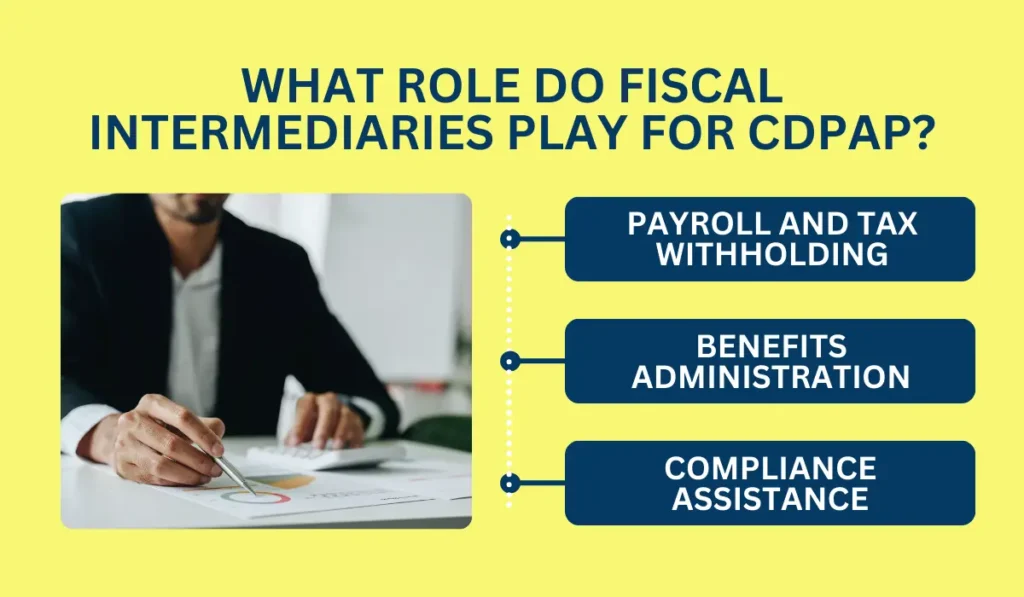If you or a loved one benefits from home care services, you’re likely familiar with the hefty investment of not only money, but also time these services require. In addition to handling payroll for your caregiver, you’re also responsible for legal paperwork, benefits administration, and compliance with local regulations.
If you’re enrolled in Medicaid’s CDPAP program, there’s a way to alleviate some of that stress, giving you time to focus on choosing the right personal care plan for you. Read on for more information on hiring a CDPAP fiscal intermediary and the type of services they provide.
Key Takeaways
- A CDPAP fiscal intermediary can help beneficiaries of the Medicaid CDPAP program navigate the financial and administrative aspects of their care.
- Fiscal intermediaries provide support services like handling payroll and benefits administration for health care providers, as well as ensuring compliance with local laws and regulations.
- When looking for a fiscal intermediary, make sure that they are established and have experience, can speak your language, and are conveniently located and easily accessible to you.
Apply for PCA/HHA today
What Is a CDPAP Fiscal Intermediary?
If you or a loved one benefits from the U.S. government’s Medicaid Consumer Directed Personal Assistance Program (CDPAP), you’ll know firsthand of the advantages it provides recipients of home care (namely, control over which home health services they receive and how).
Taking control of your home care services also means taking control of the financial and administrative responsibilities that come with receiving those services.
A fiscal intermediary can help you by assuming those financial responsibilities, allowing you to focus on choosing the right services for you while resting assured that your caregiver is being properly compensated.
What Does a CDPAP Fiscal Intermediary Do?
- Payroll and tax withholding for your caregiver
- Administering your caregiver’s benefits
- Ensuring you comply with local laws and regulations and maintaining updated documentation
What Role Do Fiscal Intermediaries Play for CDPAP (Consumer Directed Personal Assistance Program)?

Fiscal intermediaries handle a variety of aspects of your CDPAP. Essentially, they take over all financial and administrative duties. Below is a breakdown of their primary responsibilities.
Payroll and Tax Withholding
A CDPAP fiscal intermediary will take over payroll and tax withholding for your caregiver, ensuring that they are always paid the proper amount on time and that the required amount of federal and state taxes are withheld from their paycheck.
Whether you’ve hired a loved one as your CDPAP caregiver or outsourced a professional, you’ll have the peace of mind of knowing they’ll always be properly compensated.
Benefits Administration
CDPAP fiscal intermediaries can also administer benefits for CDPAP caregivers. CDPAP offers a benefits package for its caregivers that may include paid time off, sick leave, increased pay on holidays, insurance (including health insurance, dental insurance, life insurance, and medical bridge insurance), initial and annual health assessments, 401(k) options, and direct deposit options.
A fiscal intermediary can act as a middleman to handle all the logistics, paperwork, and financial components of these benefits, ensuring your caregiver receives all the benefits they’re entitled to.
Compliance Assistance
A fiscal intermediary is educated on all necessary laws and regulations with which CDPAP caregivers must comply. This means that your intermediary can walk you through these laws and regulations and keep all of your associated documentation up to date. This might include contracts, employment paperwork, and any interactions with an agency (if you’ve hired your caregiver through one).
What Should You Look For in a Fiscal Intermediary?
Before hiring your fiscal intermediary, there are some crucial qualifiers to check for that might inform your decision.
- Make sure the fiscal intermediary is an established provider that has experience.
- Make sure the fiscal intermediary speaks your language and has resources to accommodate your language.
- Check the fiscal intermediary’s locations to ensure they are conveniently located and easily accessible to you.